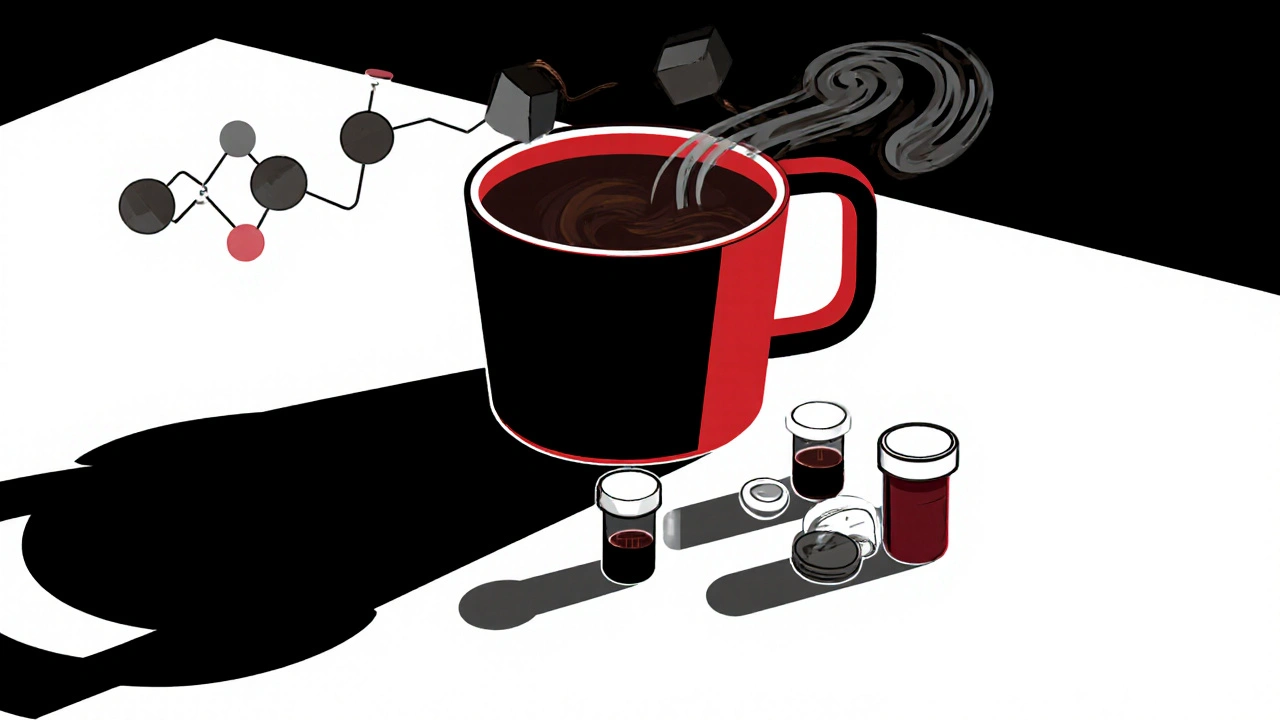Drug Interactions with Caffeine: What You Need to Know
When you drink coffee, tea, or energy drinks, you're consuming caffeine, a central nervous system stimulant found in many foods and medications. Also known as 1,3,7-trimethylxanthine, it’s not just a wake-up call—it can interfere with how your body processes other drugs. That’s why drug interactions with caffeine matter more than most people realize.
Caffeine doesn’t just make you alert. It affects liver enzymes—especially CYP1A2—that break down over 50 common medications. If caffeine slows down how fast your body clears a drug, levels build up and side effects grow. If it speeds things up, the drug might not work at all. For example, if you’re on antidepressants, like SSRIs or tricyclics used to treat depression and anxiety, caffeine can boost jitteriness, heart palpitations, or even raise blood pressure. That’s why posts like "Weight Gain from Antidepressants" and "Compare Elavil (Amitriptyline) with Alternatives" often mention caffeine as a hidden trigger for side effects.
It’s not just mood meds. QT-prolonging drugs, like certain antibiotics, antifungals, and heart rhythm meds, can turn dangerous when mixed with caffeine. Both can stretch the heart’s electrical cycle, raising the risk of Torsades de Pointes—a rare but deadly arrhythmia. If you’re on oseltamivir, the flu drug Tamiflu, or diclofenac gel, a topical NSAID for pain, caffeine won’t cause major issues—but it can still make side effects like nausea or headaches worse. Even diabetes medications, like empagliflozin or metformin, can be affected. Caffeine can briefly spike blood sugar, which might throw off your dosing if you’re not tracking it.
And it’s not just pills. Caffeine in supplements, energy shots, or even chocolate can add up. People don’t realize they’re drinking three cups of coffee, taking a pre-workout, and snacking on dark chocolate—all while on a new prescription. That’s why posts on medication safety, like those covering oseltamivir, calcium supplements, or simethicone while breastfeeding, always stress checking for hidden stimulants.
You don’t have to quit caffeine. But you do need to know who it’s safe with and who it’s not. If you take more than one medication, if you’ve had heart issues, or if you suddenly feel more anxious or your heart races after coffee, talk to your doctor. The articles below cover real cases, real interactions, and simple steps to avoid trouble—without giving up your daily ritual.

Caffeine and Medications: How Your Coffee Could Be Making Your Pills Less Effective
- Oct, 28 2025
- 9
Caffeine can interfere with common medications like warfarin, thyroid hormone, and antidepressants, leading to reduced effectiveness or dangerous side effects. Learn how to safely enjoy coffee while taking prescription drugs.
Categories
- Health and Medicine (62)
- Health and Wellness (57)
- Medicine (37)
- Women's Health (11)
- Mental Health (9)
- Men's Health (7)
- Beauty and Wellness (4)
- Health Information (4)
Archives
- February 2026 (8)
- January 2026 (25)
- December 2025 (28)
- November 2025 (25)
- October 2025 (27)
- September 2025 (14)
- August 2025 (3)
- July 2025 (2)
- June 2025 (2)
- May 2025 (3)
- April 2025 (4)
- March 2025 (4)
- online pharmacy
- medication safety
- dietary supplement
- health benefits
- dietary supplements
- generic drugs
- prevention
- fertility
- online pharmacy Australia
- side effects
- QT prolongation
- medication side effects
- diabetes medications
- GLP-1 agonists
- nocebo effect
- brand vs generic
- treatment
- treatment options
- benefits
- connection
